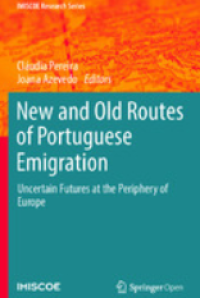
Text
E-book New and Old Routes of Portuguese Emigration : Uncertain Futures at the Periphery of Europe
Penilaian
0,0
dari 5Few studies have addressed recent emigration from European countries. The refu-gee crisis and migratory pressure have helped keep academic attention over the last few decades focused on immigration, asylum, reception and integration in Europe. However, these dynamics promoting entries into European countries coexist with other fairly significant dynamics promoting departures from these countries. The sovereign debt crisis coupled with austerity policies that asymmetrically affected Europe’s peripheral countries have exacerbated the phenomenon of emigration in various European countries.These migrant outflows can be observed in the peripheries of Europe – in Ireland (western periphery), Spain, Italy, Greece and Portugal (southern periphery), Poland, Bulgaria, Romania and Latvia (eastern periphery). The migrants that make up these flows have primarily emigrated to Western and Northern European countries, such as Germany and the United Kingdom. More specifically, their migrations have for the most part shifted towards major cities – to London, a “eurocity”, in the United Kingdom’s case (King et al. 2016). It is important to analyse the impact of inequali-ties on these outflows, reconciling the perspective of the destination countries with that of the countries of origin and relating this to more widespread processes of socioeconomic globalization.Our book aims to counter the invisibility of emigration from European countries in the literature by examining the particularities of the Portuguese case. We seek to understand the structural and conjunctural factors that characterise the fourth wave of Portuguese emigration, comparing Portugal’s experience of emigration with that of other Southern and Eastern European peripheral countries. We highlight the 2significant volume of outflows in the fourth wave of Portuguese emigration, the direction of these flows, and the profiles of current emigrants. These flows are con-centrated within Europe – in both old (France) and new emigration destinations (United Kingdom),1 but are also significant outside Europe in historical destinations with post-colonial continuities (Angola and Brazil). Therefore, the fourth wave of Portuguese emigration moves predominantly from southern to northern Europe, but also from the Global North to the Global South. It is argued that the economic reces-sion that followed the 2008 financial crisis played a decisive role in these recent emigration dynamics, together with other factors that are discussed extensively by the authors in this book.
Ketersediaan
Informasi Detail
- Judul Seri
-
-
- No. Panggil
-
304.82469 ABR n
- Penerbit
- Switzerland : Springer Nature., 2019
- Deskripsi Fisik
-
300 hlm
- Bahasa
-
English
- ISBN/ISSN
-
9783030151348
- Klasifikasi
-
304.82
- Tipe Isi
-
text
- Tipe Media
-
computer
- Tipe Pembawa
-
online resource
- Edisi
-
-
- Subjek
- Info Detail Spesifik
-
-
- Pernyataan Tanggungjawab
-
-
Versi lain/terkait
Tidak tersedia versi lain
Lampiran Berkas
Komentar
Anda harus masuk sebelum memberikan komentar
 Karya Umum
Karya Umum  Filsafat
Filsafat  Agama
Agama  Ilmu-ilmu Sosial
Ilmu-ilmu Sosial  Bahasa
Bahasa  Ilmu-ilmu Murni
Ilmu-ilmu Murni  Ilmu-ilmu Terapan
Ilmu-ilmu Terapan  Kesenian, Hiburan, dan Olahraga
Kesenian, Hiburan, dan Olahraga  Kesusastraan
Kesusastraan  Geografi dan Sejarah
Geografi dan Sejarah